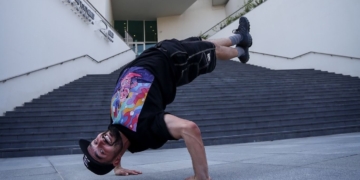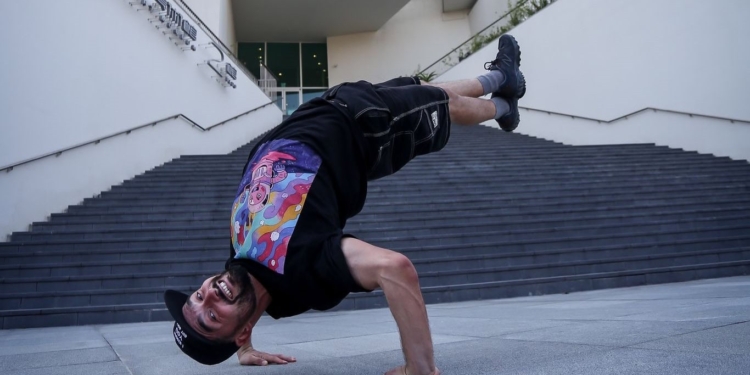
The 2024 Olympic Games in Paris marked a historic moment for breakdancing, debuting as an official sport and capturing global attention — particularly thanks to Australia’s breakdancer Raygun, whose performance went viral not for its technical prowess, but for the fact she failed to score a single point.
As the world buzzed about Raygun’s unconventional moves, questions arose about other nations’ participation – or lack thereof – in Olympic breaking.
Notably absent was Israel, a country with a rich and evolving breakdancing scene. To understand this absence and gain insight into Israel’s breaking community, we spoke with Yakov Krawec (also known by his breaker name “Bboy Poter”), a four-time Israeli breaking champion and veteran of the scene.
Krawec begins by explaining the challenging Olympic qualification process that left Israel on the sidelines.
“Only 32 breakdance athletes from all over the world get the chance to be in the Olympics,” he said, pointing out that while Israel boasts talented breakers, the European qualification route is particularly competitive, and Israel simply didn’t succeed in elbowing its way into the qualifying bracket.
This complication was less prominent for countries from other geographical groups. “For example, if we talk about Raygun or the other people from Australia or New Zealand, it’s easier for them because they don’t have as high a level of breaking there.”
Regarding Raygun’s viral performance, Krawec offered a measured and respectful perspective. “I think she did what she could,” he said, acknowledging the immense pressure of the Olympic stage. “It’s not nice that people make fun of her,” he added, emphasizing the importance of respect within the breaking community.

Krawec also noted that the viral clips don’t tell the whole story: “If you look at Raygun’s entire solo performance, it’s not that bad. Yes, it’s not the highest level — even in Israel we have better b-girls [female breakers] — but we’re not in Oceania, so we didn’t have the chance.”
Krawec’s insights come from a wealth of experience. He began breaking in 2004, at the age of 12, at a time when the Israeli scene was still in its infancy.
“Breaking then was really different,” he recalled. “We didn’t have the knowledge that people have now, and we didn’t have the Internet.”
Learning resources were scarce, there were also limited to rare VHS tapes of international competitions. Live performances at bars and bat mitzvahs were uncommon as well.
This scarcity fostered a close-knit community. Breakers would gather at infrequent events to share knowledge and showcase their skills, creating a unique learning environment.
Fast forward to today, and the Israeli breaking scene has transformed dramatically.
“Breaking in Israel is good,” Krawec asserted. “There are a lot of kids [learning it] now. The next generation is doing really great. They have breaking teachers in many cities and towns [throughout Israel].”
The art form’s growth is also evident in the increasing number of competitions and events. “Before the war, we would have a competition every month; sometimes two.”
The scene is geographically diverse, with strong breaking communities spread out across the country.
“There are really good breaking crews in Beersheva, Tel Aviv, in the north and the center,” Krawec told ISRAEL21c, highlighting the Takiri Dance Studio in Bat Yam as a hub where many b-boys and b-girls gather for open practice sessions.
Looking to the future, Krawec remains optimistic about breaking in Israel and globally. While breaking will not feature in the 2028 Olympics, he sees the sport’s Olympic inclusion as opening new doors for breakers to profit from their passion.
“I think now the next generation will be able to make a living out of this just from competitions and being [professional breaker] athletes,” he predicted.
Krawec himself continues to compete at the highest levels, representing Israel in international competitions.
“In November, they have the World Championship in Houston, Texas, so I will go to represent Israel there,” he said.
He’s also actively engaged in teaching and community outreach, particularly in areas affected by recent conflicts. “Now I’m doing a project in the south of Israel, in all the settlements near Gaza. I’m teaching the kids that have been more affected by the war,” he shared.
While Olympic glory may have eluded them this time, the passion, skill, and community spirit of Israel’s breakers suggest a bright future. From its humble beginnings with VHS tapes and sporadic gatherings to today’s regular competitions and dedicated training spaces, Israeli breaking has come a long way.
As Krawec notes to wrap up our conversation: “The next generation is in good hands here in Israel.”
Produced in association with ISRAEL21c


























 Continue with Google
Continue with Google